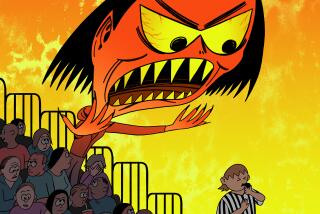A Verdict--and a Warning
- Share via
The affair is full of such pure pathos and sadness that almost everyone will be struck by some detail. We’re talking about the so-called “hockey dad” homicide trial, which ended Friday with an involuntary manslaughter verdict and a possible prison term of three to five years. Other than its Massachusetts ice rink locale, the deadly confrontation really had little to do with hockey. It should be the “macho parent” trial, which would require more of us to do some honest self-examination. This may be the larger lesson for those who so enjoy watching and encouraging our children to exercise their bodies and minds in earnest amateur athletic competition.
The case facts are simple: Some boys were playing pickup hockey loosely supervised by one dad. Age 12 is when “checking,” physically skating into an opponent who has the puck, becomes legal. One doting father, a 275-pound truck driver named Thomas Junta, confronted the volunteer coach, a 156-pound father named Michael Costin, whose sons were also on the ice, playing on the rougher, losing team, as it happened.
Junta said hockey’s “about having fun.” He thought the play was too rough. Costin actually agreed; he had just urged the boys to ease up a bit. But to this challenging stranger, Costin uttered a peremptory retort that hockey was rough. Within minutes the larger father who objected to too much rough play was beating to death the smaller father who agreed but wouldn’t back down. And the children watched. How’s that for avoidable tragedy?
Parents are genetically programmed to protect their young. We willingly give them up to learn from professional teachers out of our sight in schools. Then, we drive our children to sports and willingly deliver them to volunteers to teach right before our eyes. We cheer. We groan. We worry about injuries. We wince over mistakes and hope they do their best. But if parents are honest, at times we also quietly question (and sometimes not quietly) this coach-person down there suddenly controlling our child’s fortunes.
Maybe we think the coach ought to play our child more, be a little kinder, more understanding to this precious youngster and, by the way, not yell quite so loudly or berate so harshly. It’s a game, right? Anyway, we hope our children learn the rules of the game and also the skills of winning and losing with different teammates and bosses. That’s the obvious part.
It’s exciting and gratifying to see our offspring learn and improve and still eagerly look over for our smiles and applause. What’s less obvious under the emotional pressures of such surrogate competition is that even as dedicated, determined and devoted spectators, the protective parents too should be learning-- ultimately, to let their children go. It’s hard to hover and not interfere emotionally, to balance protection with overprotection as they grow up. But it is the grown-up thing to do.

